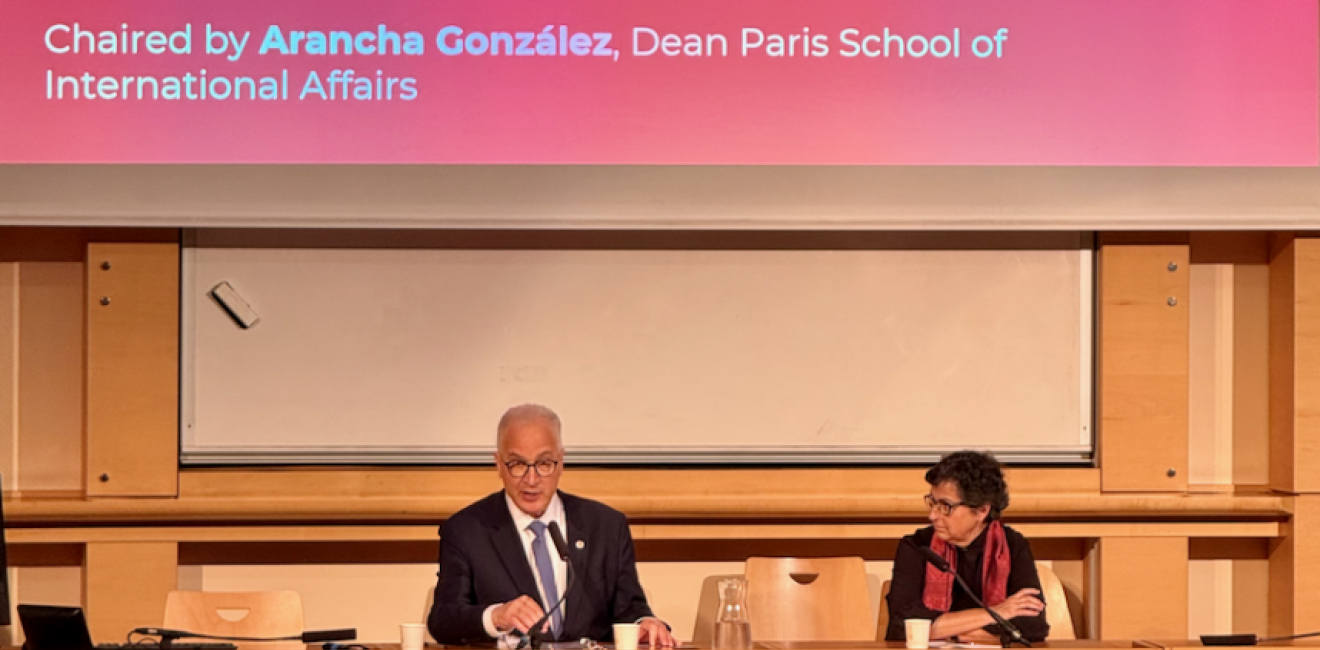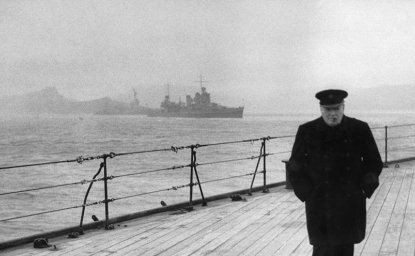Speech to Sciences Po Paris School of International Relations
As delivered October 14, 2024
Congratulations on attending one of the finest schools of international affairs on the planet. I have no doubt that under the able leadership of Dean Gonzales that the star of the Paris School of International Affairs will rise even higher. Besides the insightful coursework you receive, you can learn from two other sources while you are here – each other and Paris. With classmates from a hundred nations, take time to gain their perspectives to get a more holistic view of the world. Living in a city that has often been at the center of action, that is filled with world-class museums and whose every square embodies a rich tapestry of history, be curious and explore the lessons they hold for the future.
When you pass a statue ask what motivated society to invest in that statue and bestow the person with such an honor. In what ways do you agree or disagree with that person’s actions? How can we learn from their experiences? Let me draw your attention to two statues here in Paris. The statues of Jean-Baptiste Colbert near the National Assembly and Winston Churchill near the Petit Palace. If they came to life, they could almost see each other across the Seine. Their policies shaped history and are now shaping today’s US foreign policy
With the rivalry between France and Britain, why would an Englishman be given such pride of place? Because Churchill’s courage, determination and eloquence rallied the allies to defeat the totalitarian threat of his day. In 1952, less than a decade after World War II’s end, Churchill shared what he had learned in the crucible of war saying, “It is my belief that by accumulating deterrents of all kinds against aggression we shall, in fact, ward off the fearful catastrophe, the fears of which darken the life and mar the progress of all the peoples of the globe.”
If Churchill were alive today, he would say that the number one priority of the US and its allies must be to deter conflict with today’s authoritarian leaders – the quartet of chaos that lead China, Russia, Iran and North Korea. We should do all we can to avoid conflict between the great powers that would have a horrific impact on all nations.
To students from those countries, let me say welcome. I hope we can be friends. America’s goal is that our countries can remain at peace. America’s path to do that follows Churchill’s precept – to accumulate all kinds of deterrents against aggression.
Colbert, First Minister of State under the Louis XIV, drove economic policies that made the lavishness of that reign possible. He was one of the Sun King’s most trusted advisors, an “accomplished manager… responsible for developing trade, industry and the merchant navy, modernizing Paris, and backing new advances in the sciences.” His economic theory that encourages state intervention and protectionism is known today as “Colbertism.”
Yet even as Colbert's economic management made Versailles possible, did he also sow the seeds for the monarchy’s downfall? His protectionist industrial policies to maximize exports and minimize imports inflated the cost of basic goods and created a rigid economic system that stifled innovation and adaptability. Over time, this limited economic opportunities for the growing middle class, fostering a discontent that contributed to forces that resulted in the French Revolution.
America’s foreign policy today can be viewed as driven by a Churchillian resolve to strengthen deterrence against the militarization of China, Russia and Iran, just as Churchill advocated against Germany and Italy. Sadly, it also embraces Colbert’s protectionism. The result is a US foreign policy very different than the past. Both of America’s political parties have shifted nearly in unison.
Seeking to blunt Chinese economic distortions, both parties are more focused on industrial policy and less focused on complying with, much less advancing, international trade norms. China has long sought to be less reliant on the West. America is now reciprocating. The result is an increasingly divided global economy.
Facing increasingly aggressive and coordinated authoritarian powers, both candidates will be far more demanding of allies contributing to securing the peace.
Economic Policy
The US seeks to collaborate with China where we can, compete where we must, and achieve Churchill’s goal of deferring conflict by convincing China’s Xi Jinping not to spark conflict in East Asia. Four efforts at deterrence have led to industrial policy replacing America’s historical open markets approach.
First, ensuring supply chain resilience in the event of a Taiwan or South China Sea “contingency.” While continued trade ties between the US and China help deter aggression, Xi could be encouraged to act if he perceived the US as so dependent for critical supplies on the Peoples’ Republic of China (PRC) that America would be hamstrung if conflict arose.
Churchill’s advice motivated the US government to not allow overreliance on Chinese supply chains to undermine deterrence. The US government has intensified its focus on supply chains and provided subsidies for domestic semiconductor production. Yet it is a slippery slope that leads from supply chain resilience to protectionism.
Targeted tariffs on Chinese imports to encourage a diversification of critical supply chains would be Churchillian deterrence. The actual broader tariffs imposed also reflect Colbertism, or simply protectionism. Trump’s proposed higher tariffs on everyone reflects both influences as it seeks in part to keep China from sidestepping tariffs by diverting goods through other countries.
Biden’s steel tariffs and both candidates opposing Nippon Steel’s purchase of US Steel are pure Colbert.
The focus on supply chains began in the Trump administration and was magnified in the Biden administration.
Trump’s Chinese tariffs have largely been continued and expanded by President Biden.
The Chips and Science Act passed with strong bipartisan support.
This level of industrial policy is a big change from the past, with little difference between candidates.
As America joins China is seeking to avoid overreliance on the other, countries will increasingly be required to develop authentically separate supply chains if they wish to serve both markets.
Second, preventing the PRC’s ability to digitally disrupt America’s society or economy. The PRC’s Cybersecurity and National Intelligence laws and other regulations compel companies to allow the PRC government to secretly access data. The PRC’s recent tech crackdown reflects an even tighter Chinese Communist Party (CCP) control of private companies.
To avoid allowing the CCP to gain access to information, influence American public opinion or control devices in the Internet of things, America has exercised deterrence by limiting Huawei telecom equipment and more recently, placing restrictions on Tik Tok, port cranes, and software on vehicles.
Actions limiting the PRC’s ability to disrupt began with President Obama and accelerated during the Trump and Biden-Harris administrations.
Again, these actions are a big change from the past, with little difference between candidates.
The third effort at deterrence driving a more interventionist economic approach is to prevent US technologies from benefiting the PRC’s military. With the PRC directing all civil technology in the service of its military and rapidly developing military technology directed towards America and its allies, America does not want to facilitate accelerating that process. To deter future aggression, America has recently implemented export and outbound investment controls on semiconductor and other technologies.
Such restrictions began under Biden but will certainly be continued in the next administration.
Yet another big change from the past, with little difference among candidates.
These three technology related restrictions will result in American and allied technology facing increased government scrutiny when sold to countries that are adopting Chinese technology and standards.
The fourth effort is to not trade energy independence for dependence. Today, America is the world’s largest producer of oil and gas, and a big exporter. Deterrence suffers if America surrenders its energy independence and ability to supply friends with traditional energies for being dependent on the PRC for new energies. The US needs to also be a leading producer of clean energies to ensure it does not diminish its competitive posture. Thus, both Churchill and Colbert impulses are behind the geographically restricted energy subsidies in the IRA Act and Biden’s EV tariffs.
Europe, a major energy importer, chose to tax carbon. The US, the leading carbon fuel producer, chose to subsidize new energy rather than tax carbon. This has spurred significant grown in renewables that now represent 22% of electricity production, more than nuclear or coal and approaching the level of natural gas.
Given the impact of America’s energy industry on its economy and its importance in supplying Europe, nobody should be surprised that the Biden administration approved more oil and gas drilling permits for wells on federal lands during its first three years than the comparable period during the Trump administration, nor that Harris changed her position on fracking.
Still, America’s subsidies are sparking significant investments in new energies with solar growing 75% and wind 11% between 2023 and 2025. With much of the new investments in battery production and wind and solar generation occurring in Republican districts and many of Trump’s supporters favoring advances in hydrogen and carbon capture, the difference in policy impact would likely be less than many have forecasted.
Security Policy
Today’s increased collaboration among authoritarian regimes would scare Churchill. It elevates the need to deter or win a multi-front conflict, something for which the US is not fully prepared. This has led to an intensified push for European and Asian allies to step up their investment in military capabilities. Some suggest this means the US must focus exclusively on deterring China. These attitudes are naïve and dangerous. As we seek to dissuade Xi from acting, the outcome of the Ukraine conflict matters.
Charles de Gaulle, whose statue is a short walk from Churchill’s, pulled French troops out of NATO. The talk of America withdrawing from NATO like de Gaulle is overblown. The fact that Europe is stepping up more to its own defense is under-reported. Given real threats to European security, European countries, not just the US, will encourage each other to do even more.
Russia seeks four goals - territory, destabilizing Ukraine, destabilizing Europe and fracturing the Western Alliance.
While a prolonged period of fighting may gain more territory, it extends the period Ukraine and Europe are destabilized and with rising voter resistance against continued aid risks splintering the alliance.
There are multiple paths to an outcome that could constitute a Ukrainian win considering the odds they face.
The goals should be a lasting peace and prosperous Ukraine.
I note that the Korean Peninsula has been in a state of temporary truce since signing the armistice in 1953. Without a peace treaty, South Korea has prospered for over 70 years.
Finding a conclusion to the tragic conflict in the Middle East is even more complex and elusive. Here again, a key focus of the US is to deter escalation.
Emerging Market Engagement
Luckily, America is also emulating a third leader–President John F. Kennedy, who actively engaged emerging markets. He founded the Peace Corps and the US Agency for International Development. That aid continues today and has been bolstered by greater investment support from the G7’s Partnership for Global Infrastructure.
When JFK signed the Trade Expansion Act, he observed, “we cannot protect our economy by stagnating behind tariff walls, but that the best protection possible is a mutual lowering of tariff barriers among friendly nations so that all may benefit from a free flow of goods.” His spirit of expanded trade with friendly countries continues in bipartisan Congressional support for renewing the African Growth and Opportunity Act and trade expansion measures in Latin America and the Indo-Pacific.
Conclusion
America’s evolution in its foreign policy is real and bipartisan. That is not to say it is the right policy. I hope Winston Churchill was right when he observed that “Americans will always do the right thing…after they have tried everything else."
Being so far away of the horrors of global conflicts makes it hard to spark adequate Churchillian actions to bolster true deterrence.
Being so far away from how a tit for tit escalation in trade restrictions magnified the misery of the Great Depression dims the understanding of the danger of Colbert-like protectionist actions.
The PRC is more of a peer competitor than any the US has faced since its early battles with the United Kingdom. The only way America retains the overmatch it has long enjoyed is through close collaboration with allies and partners. That is why it is important that America and its allies find common ground.
America’s competitive position would be stronger if it resisted nationalist and protectionist pressures, expanded trade with emerging markets and allies as it pulls back from trade with the PRC, coordinated more closely with allies, and led by example by increasing its own defense spending.
Let us not back away from the ties that bind us but lean into them. We face many shared challenges and are more likely to overcome them together. Let’s find ways to move closer to each other to join hands in common pursuits. America would be best to leave Colbertism in Paris and embrace Churchill and Kennedy instead.
Author
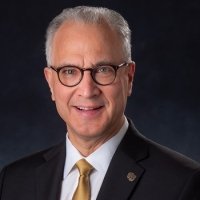

Wahba Institute for Strategic Competition
The Wahba Institute for Strategic Competition works to shape conversations and inspire meaningful action to strengthen technology, trade, infrastructure, and energy as part of American economic and global leadership that benefits the nation and the world. Read more

Explore More
Browse Insights & Analysis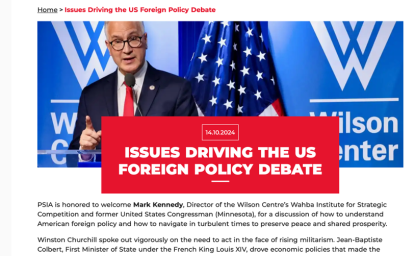
US Foreign Policy Insights with Mark Kennedy
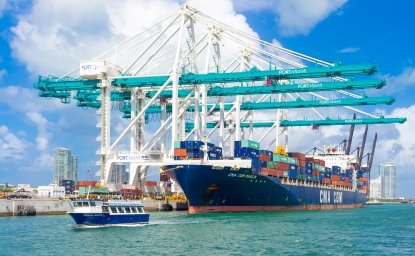
Global Ports and US Maritime Strategy: Critical to Competitiveness and Daily Life



